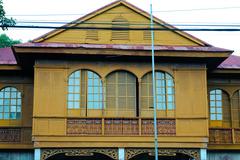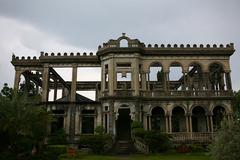University of Negros Occidental – Recoletos Visiting Hours, Tickets, and Historical Site Guide in Bacolod, Philippines
Date: 04/07/2025
Introduction
The University of Negros Occidental – Recoletos (UNO-R) stands as a distinguished educational, cultural, and spiritual landmark in Bacolod City, Philippines. Founded in 1941, this Catholic institution is renowned not only for its academic excellence but also for its vibrant heritage and commitment to holistic development. As the first university in Negros Occidental, UNO-R seamlessly blends a rich Augustinian Recollect tradition with modern campus life, making it an essential destination for students, pilgrims, history buffs, and tourists alike. This comprehensive guide details UNO-R’s history, visiting hours, campus features, tour options, and nearby Bacolod attractions—ensuring a meaningful and memorable visit (University of Negros Occidental – Recoletos History and Visitor Information).
Table of Contents
- Historical Overview and Cultural Significance
- Campus Location, Visiting Hours, and Admission
- Campus Tours and Events
- Spiritual and Cultural Experience
- Nearby Attractions in Bacolod
- Travel Tips for Visitors
- Frequently Asked Questions (FAQ)
- Leadership and Legacy
- How to Plan Your Visit
- References
Historical Overview and Cultural Significance
Founding and Growth
UNO-R traces its beginnings to 1941, when Dr. Antonio A. Lizares and Dr. Francisco Kilayko established the Occidental Negros Institute (ONI) in Talisay, Negros Occidental. After a brief closure during World War II, the school reopened in Bacolod City in 1946, eventually expanding to offer elementary, high school, and college programs. Its move to Lizares Avenue solidified its central role in the city.
Transition to University Status
On May 15, 1957, ONI achieved university status, becoming the University of Negros Occidental (UNO)—the first university in the province. Dr. Antonio Lizares was its first president.
Augustinian Recollect Acquisition
In 1962, the Order of Augustinian Recollects assumed stewardship of the university, renaming it UNO-R. This brought a renewed emphasis on the Catholic educational tradition of “Caritas et Scientia” (Charity and Knowledge), shaping UNO-R’s mission of integrating faith, knowledge, and service (University of Negros Occidental – Recoletos History and Visitor Information).
Role in the Bacolod Community
As a premier educational institution, UNO-R has played a pivotal role in Bacolod’s cultural, academic, and spiritual landscape. Its commitment to holistic development and community service continues to impact generations of students and the wider public.
Campus Location, Visiting Hours, and Admission
Location and Facilities
UNO-R’s main campus is located at 51 Lizares Avenue, Bacolod City. Visitors will find a harmonious blend of historic architecture and modern amenities, including academic buildings, libraries, landscaped gardens, sports complexes, and spiritual spaces (Vigattin Tourism).
Visiting Hours
- Campus: 8:00 AM – 5:00 PM, Monday to Saturday
- Oratory and Chapel: 7:00 AM – 6:00 PM, Monday to Saturday
(Hours may extend during special liturgical events; check UNO-R Campus Ministry for updates.)
Admission and Fees
- General Admission: Free of charge; no tickets required
- Donations: Voluntary donations are welcome for the upkeep of spiritual spaces
Accessibility
- The campus is wheelchair accessible with ramps and accessible restrooms.
- Public transport (jeepneys, taxis) and on-site parking are available (Free Apply).
Campus Tours and Events
- Guided Tours: Available by prior appointment via the university’s administration or Campus Ministry. Tours highlight UNO-R’s history, spiritual heritage, and academic offerings.
- Special Events: The university hosts cultural celebrations, academic fairs, and religious festivals. Check the events calendar for public activities.
Spiritual and Cultural Experience
- St. Nicholas of Tolentine Oratory: The spiritual heart of campus, hosting daily Masses and devotional activities. Open to visitors for prayer and reflection.
- Campus Ministry Programs: Participate in retreats, recollections, and outreach programs. The Campus Ministry Office welcomes inquiries and walk-ins (UNO-R Campus Ministry).
- Cultural Activities: University Week, Marian processions, and feast day celebrations enrich the visitor experience and showcase Filipino Catholic traditions.
Nearby Attractions in Bacolod
UNO-R’s central location offers easy access to several notable Bacolod attractions:
- San Sebastian Cathedral: Historic Catholic cathedral, 25-minute walk (Tourist Places Guide)
- Negros Museum: Cultural heritage exhibits, 10 minutes by car (The Pinay Solo Backpacker)
- The Ruins: Iconic heritage mansion, 20 minutes by car (The Pinay Solo Backpacker)
- Silay Heritage Houses: Over 30 ancestral homes, 30 minutes by car (The Pinay Solo Backpacker)
- MassKara Festival: Colorful celebration every October, animating the city and campus (Tourist Places Guide)
For more details, visit Bacolod City Tourism.
Travel Tips for Visitors
- Dress Code: Wear modest attire, especially in spiritual spaces.
- Photography: Permitted outdoors and in public areas; avoid flash and respect privacy during ceremonies.
- Best Time to Visit: During University Week or MassKara Festival for cultural immersion.
- Dining: Try Bacolod’s famous chicken inasal at nearby Manokan Country (The Pinay Solo Backpacker).
- Transportation: Jeepneys and taxis are widely available; car rentals recommended for day trips.
Frequently Asked Questions (FAQ)
Q: What are UNO-R’s visiting hours?
A: 8:00 AM – 5:00 PM, Monday to Saturday for the campus; 7:00 AM – 6:00 PM for the oratory.
Q: Is there an entrance fee?
A: No, admission to the campus and oratory is free.
Q: Are guided tours available?
A: Yes, by appointment via the university’s administration or Campus Ministry.
Q: How do I reach UNO-R?
A: The campus is accessible by public jeepney, taxi, or private car. Parking is available on site.
Q: Is the campus accessible for people with disabilities?
A: Yes, the campus includes ramps and accessible facilities.
Leadership and Legacy
UNO-R is currently led by Reverend Fr. Joel A. Alve, the university’s 18th president. The institution upholds a vision of academic excellence, spiritual formation, and community service, continuing its legacy as a beacon of charity and knowledge.
How to Plan Your Visit
- Contact: For updated information, tour bookings, and event schedules, visit the UNO-R official website or the UNO-R Campus Ministry page.
- Stay Connected: Follow UNO-R on social media for latest updates.
- Enhance Your Trip: Download the Audiala app for interactive guides, campus maps, and additional travel insights.
Visuals and Media
Include images such as:
- “UNO-R main campus entrance”
- “Historic building at University of Negros Occidental-Recoletos”
- “UNO-R student life and events”
For virtual tours and more, see UNO-R’s official gallery and media resources (UNO-R Official Website).
Summary
A visit to the University of Negros Occidental – Recoletos immerses you in the rich tapestry of Bacolod’s academic, spiritual, and cultural life. Enjoy free access to a historic campus, explore nearby heritage sites, participate in local festivals, and experience the warm hospitality of this renowned institution. For the most up-to-date visitor information, connect with UNO-R’s official channels and use the Audiala app to enhance your Bacolod adventure (UNO-R Campus Ministry, UNO-R Official Website).
References
- University of Negros Occidental – Recoletos (UNO-R): History, Campus, and Visitor Information, UNO-R Official Website
- Visiting the University of Negros Occidental – Recoletos: History, Spiritual Life, and Visitor Information, UNO-R Campus Ministry
- Visiting University of Negros Occidental Recoletos: Campus Hours, Tours, and Nearby Attractions in Bacolod, Vigattin Tourism
- Visiting University of Negros Occidental Recoletos: Campus Hours, Tours, and Nearby Attractions in Bacolod, The Pinay Solo Backpacker
For more travel guides, campus news, and cultural insights, download the Audiala app and follow us on social media.

